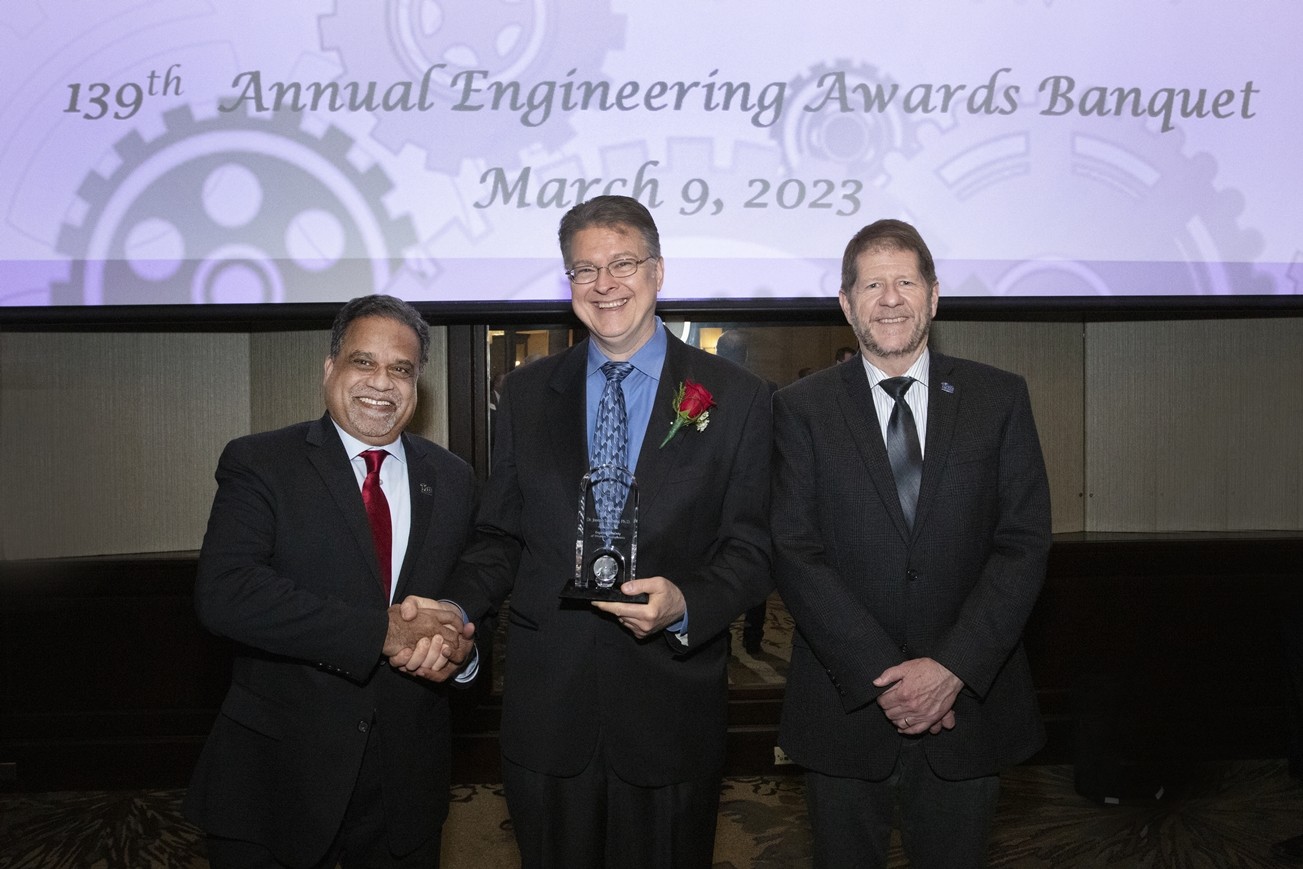BioE Professor Joseph Samosky Recognized as Higher Educator of the Year
Joseph Samosky, associate professor of bioengineering, received the Higher Educator of the Year Award from The Engineers’ Society of Western Pennsylvania (ESWP) at their annual Engineering Awards Banquet on March 9, 2023. The ESWP awards are now in their 134th year and the oldest award event in the world - predating both the Nobel Prize (1901), and the Pulitzer Prize (1917).
“Professor Samosky is an outstanding teacher, mentor and innovator who continues to develop novel approaches to experiential learning and incorporating design thinking in engineering education,” Sanjeev Shroff, interim dean of the Swanson School, said.
"Joe was a pioneer in bringing design thinking to the Swanson School of Engineering (SSoE) and incorporating user-centered design into his courses and co-curricular student programs,” said Mark Redfern, interim chair of the Department of Bioengineering. “His work was foundational to our Innovation and Entrepreneurship program and has had an enormous impact.”
Samosky received undergraduate degrees from Pitt in electrical engineering and behavioral neuroscience and received his PhD in Medical Engineering from the Harvard-MIT Division of Health Sciences and Technology. He began at Pitt in 2007 as a faculty member in the School of Medicine, then in 2014 joined the Swanson School when it was selected as one of the first 12 universities in the US to participate in the National Science Foundation’s (NSF) new Engineering Pathways to Innovation (EPI) Program, aimed at creating ways to foster innovation, creativity, empathy and entrepreneurship in engineering students.
Samosky created the new project-based experiential learning course The Art of Making: Hands-On System Design and Engineering, offered both as a first-year honors course and an upper-level undergraduate course. The Art of Making has served as a laboratory for exploration and dissemination of design thinking and experiential learning: Samosky’s pedagogical methods and content have been deployed in multiple other courses and departments and in over 20 co-curricular programs, workshops and STEM outreach events, as well as the Pitt Seed-awarded program Classroom to Community: Designing and Inventing for Real-World Impact.
“Our approach has been motivated by the recognition that students really want to change the world in positive ways. Let’s empower them to do that. Let’s start in their first year, with real-world projects and topics they are passionate about, working in teams to deeply understand people’s needs," Samosky said. “Then creatively invent new solutions, build prototypes, test them and iterate them toward effectiveness. We’re striving to create not just courses but a culture — a culture of creativity, diversity and agency, fostering an ethos that you don’t need to wait for someone else to define or solve a problem: you can do it, so bias toward action, and be human-centered and data-driven in your approach.”
Student teams in Samosky’s The Art of Making class have five times won the Best Overall Design Award at the SSoE Design Expo – including a team of first-year students competing with over 300 seniors. His students have been co-inventors on issued patents and founders of start-up companies, and he has mentored over 850 undergraduate and graduate students in over 200 projects, including students from all SSoE departments. He also pioneered development of SSoE’s G34 Design and Innovation Space, an environment where students have 24/7 swipe card access and a “home base for innovation” to explore, exchange ideas, develop prototypes and foster innovation.
“When the bar is raised high, we see students not just clear it, but soar above it,” Samosky said when accepting the award. “Student innovators in The Art of Making have developed assistive technologies for people with Parkinson’s disease, and right now at the Western PA School for Blind Children, kids are playing sports in gym class with devices designed by our students. Yet another invention is enabling children at the Western PA School for the Deaf to experience music and dance together.”
“Joe’s ideas regarding how design thinking and experiential learning should be introduced in the engineering curriculum right from the start and how human-centered design, communication skills, teamwork and challenging, hands-on, real-world projects should be incorporated in as many engineering courses as possible have transformed undergraduate engineering education at Pitt,” Redfern said.

